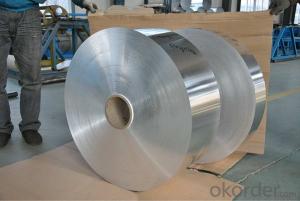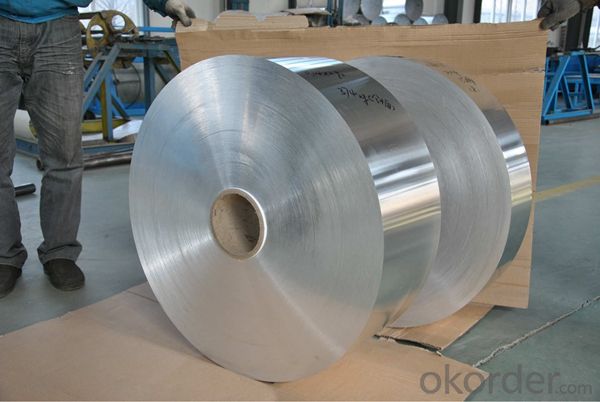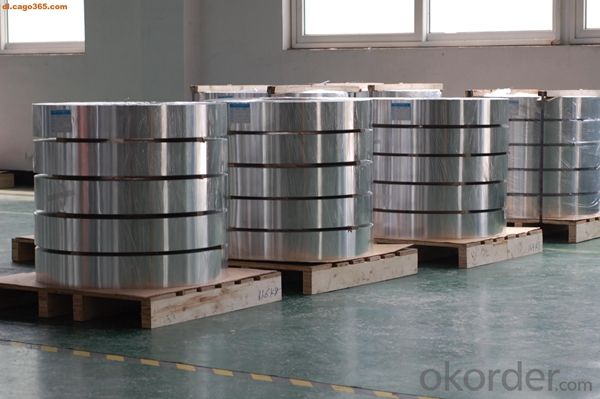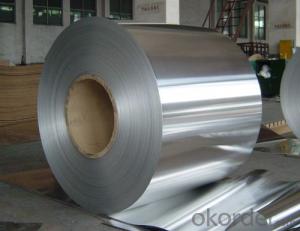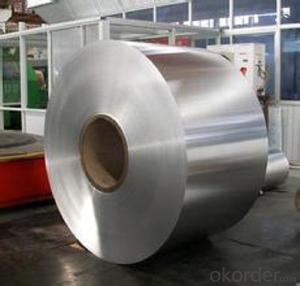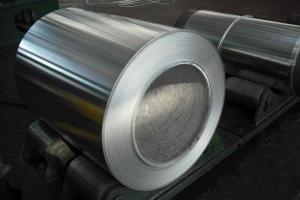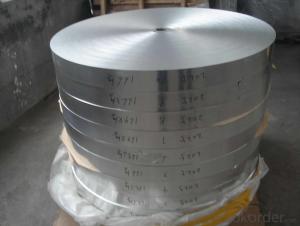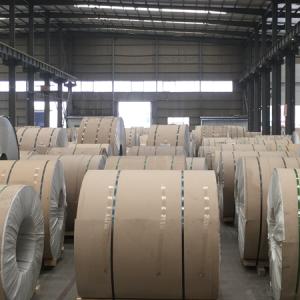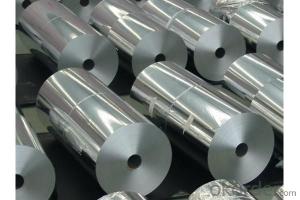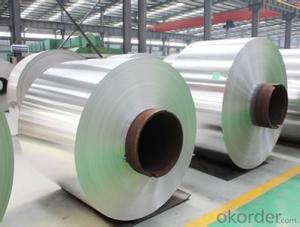5052 H32 Aluminum Alloy Coil - Continuous Cast Aluminum Coil 5005 5052 5083 for Building
- Loading Port:
- Shanghai
- Payment Terms:
- TT OR LC
- Min Order Qty:
- 5 m.t.
- Supply Capability:
- 10000 m.t./month
OKorder Service Pledge
OKorder Financial Service
You Might Also Like
Specification
1. Specification of Continuous Cast Aluminium Coil 5005 5052 5083 for Building
Name | Aluminum Coil |
Brand | CNBM |
Alloy | 1100H-18, 3003-H24,3003-H26,3005-H26,8011,3004,3105,5005,etc. |
Thickness | 0.1~1.5mm |
Width | <2000mm< span=""> |
MOQ | 1 MT |
Coating finish | Brushed, drawing, embossed, printing |
Color | As to code RAL |
Surface | Embossed,Mill Finish,Coated,Brushed |
Gloss | 10-90%(EN ISO-2813:1994) |
Total coating thick | PVDF27 ~35micron |
Polyester18~27micron(EN ISO-2360:1995) | |
Coating hardness | 2H |
Adhesion | 5B (EN ISO-2409:1994) |
Impact resistance | No cracking and peeling (A.S.T.M D2794-1993) |
Flexibility (T-bend) | 0T- 2T |
MEK resistance | 100 |
Certification | ISO9001:2000, CE, SGS |
Coil's standard diameter | 1100mm |
Inner Diameter | 405mm/505mm |
Coil's standard weight | 1MT - 2MT |
2. Application of Continuous Cast Aluminium Coil 5005 5052 5083 for Building
(1).Interior: wall cladding, ceilings, bathrooms, kitchens and balconies, shutters, doors...
(2).Exterior: wall cladding, facades, roofing, canopies, tunnels,column covers , renovations...
(3).Advertisement: display platforms, signboards, fascia, shop fronts...
3. Feature of Continuous Cast Aluminium Coil 5005 5052 5083 for Building
*Such coil is specially designed to replace aluminum ingot, due to the high export tax of aluminum ingot, the coil has better price than ingot.
*This type of coil can fit customer's remelting furnace just like ingot, no need to make any change to the production line that was previously used for ingot. The standard coil size and weight is very suitable for the feed gate of furnace.
*This type of coil causes less material wastage than ingot when remelted.
*Our coil is made directly from ore, no need to go though the ingot making process, quality is much better than other suppliers who use ingot scrap to make coil.
Be free from Oil Stain, Dent, Inclusion, Scratches, Stain, Oxide Dicoloration, Breaks, Corrosion, Roll Marks, Dirt Streaks and other defect which will interfere with use
4. Certificate:
SGS and ROHS(if client request, paid by client), MTC(plant provided), Certificate of Origin(FORM A, FORM E, CO), Bureau Veritas and SGS (if client request, paid by client), CIQS certificate
5. Image of Continuous Cast Aluminium Coil 5005 5052 5083 for Building
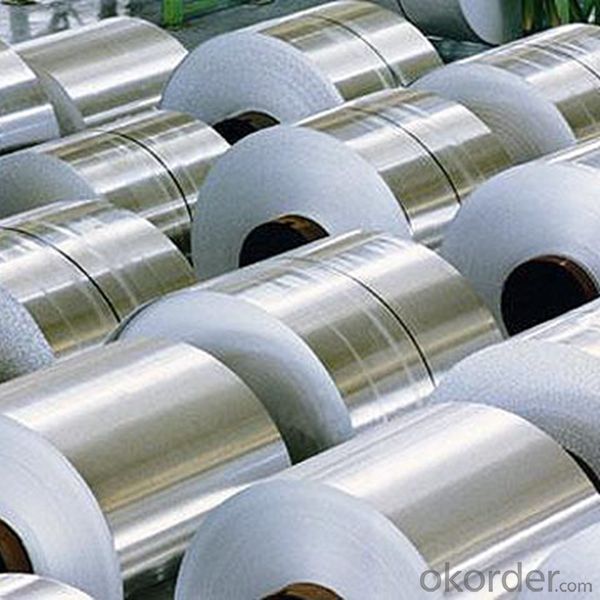
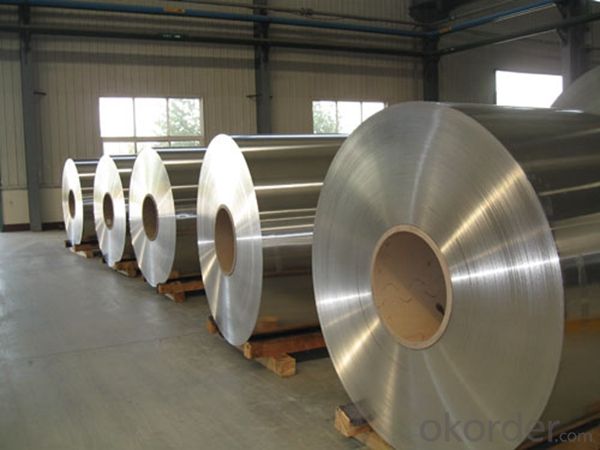
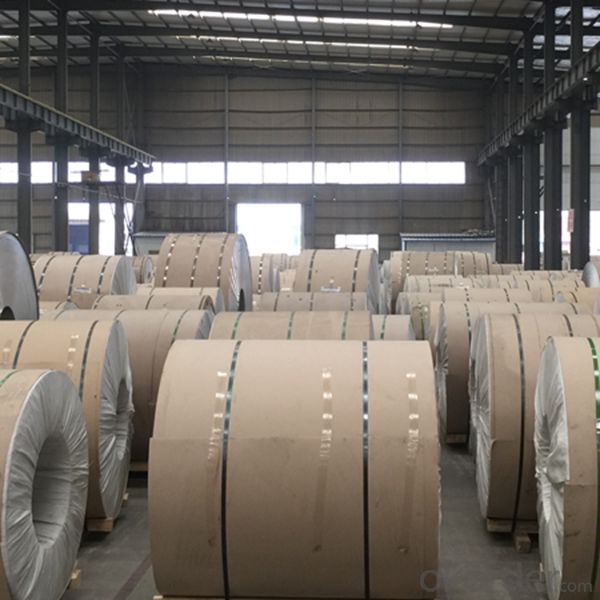
6. Package and shipping of Continuous Cast Aluminium Coil 5005 5052 5083 for Building
eye to wall
eye to the wall
with wood pallet (wooded case also available)
7. FAQ
1) What is the delivery time?
Dpends on actual order, around 20 to 35 days
2)What is the QC system:
We have QC staff of 20 persons and advanced equipment, each production is with MTC traced from Aluminum ingot lot.
3) What market do you mainly sell to?
Australia, America, Asia, Middle East, Western Europe, Africa etc
- Q: What is the electrical conductivity of aluminum coils?
- The electrical conductivity of aluminum coils is relatively high. Aluminum is known for its good conductivity, with a conductivity rating of approximately 37.7 x 10^6 siemens per meter (S/m). This makes aluminum an excellent choice for various electrical applications, including the manufacturing of coils. The high conductivity of aluminum allows for efficient transmission of electric current through the coils, making them suitable for use in electrical wiring, transformers, motors, and other electrical equipment.
- Q: May anyone tell me what's the product when hydrochloric acid reacts with aluminum?HCl + Al → ?
- AlCl3 + H2
- Q: What is the difference between pre-painted and natural aluminum coils?
- There are two types of aluminum coils used in various industries: pre-painted and natural. The surface finish is the main distinguishing factor between these two types. Pre-painted aluminum coils are coated with paint or a protective coating before delivery. This coating is applied in a controlled environment, ensuring a uniform and durable finish. The advantages of pre-painted coils include increased resistance to corrosion, improved appearance, and better ability to withstand weather conditions. They also offer a wide range of color options, which makes them suitable for architectural applications where color matching is important. On the other hand, natural aluminum coils remain untreated and maintain their original metallic appearance. These coils are commonly used in applications where the natural aluminum finish is desired, such as in the production of consumer electronics, automotive parts, and other industrial products. Natural aluminum coils are known for their excellent thermal conductivity, lightweight nature, and high strength-to-weight ratio. In conclusion, the difference between pre-painted and natural aluminum coils lies in their surface finish. Pre-painted coils have a protective layer of paint, providing improved resistance to corrosion, better appearance, and color choices. Natural aluminum coils, on the other hand, retain their original metallic appearance and are often preferred in applications where the natural aluminum finish is desired.
- Q: I own a pistol with an aluminum frame. If I were to store it away for a long time, would I need to bother wiping oil over the aluminum surfaces in addition to the steel surfaces? If it helps, there is a dark grey sort of finish on the aluminum.
- The question is why WOULDN'T you lube it? Depending on how and how long it's stored, oil drips off of parts. having oil on the frame between the barrel and frame would help with that issue. In the long run, it wouldn't HURT to lube it and could only help the situation. Gun oil is cheap, so slather it on.
- Q: Can aluminum coils be fabricated or machined?
- Yes, aluminum coils can be fabricated or machined. Aluminum coils are typically used in applications such as heating, ventilation, and air conditioning (HVAC) systems, automotive radiators, and electrical transformers. These coils can be fabricated or machined to meet specific requirements and dimensions. Fabrication of aluminum coils involves processes such as cutting, bending, and welding to create the desired shape and size. This allows for customization and adaptation to various applications. Machining, on the other hand, involves removing material from the aluminum coil using cutting tools such as lathes, mills, or CNC machines. This process is used to achieve precise dimensions, smooth finishes, and intricate designs. Overall, aluminum coils are versatile and can be fabricated or machined to suit different needs. The flexibility of aluminum as a material makes it a preferred choice for many industries, offering durability, lightweight properties, and excellent thermal conductivity.
- Q: Are aluminum coils suitable for construction purposes?
- <p>Yes, aluminum coils can be used for construction. They are valued for their lightweight, corrosion resistance, and high strength-to-weight ratio, making them ideal for applications such as roofing, facades, and structural components. Aluminum's malleability allows for easy shaping and forming, which is beneficial in various construction projects. It's also sustainable due to its recyclability, reducing environmental impact.</p>
- Q: Can aluminum coils be used in food processing equipment?
- Indeed, food processing equipment can utilize aluminum coils. The numerous advantageous properties of aluminum make it a favored option for food-related applications. Its lightweight nature, resistance to corrosion, and exceptional thermal conductivity render aluminum coils appropriate for deployment in refrigerators, freezers, ovens, and heat exchangers within the realm of food processing equipment. Furthermore, aluminum is non-toxic and does not interact with food, thereby establishing it as a secure material for direct interaction with consumable items. Nevertheless, it remains crucial to verify that the aluminum employed in food processing equipment adheres to the requisite food safety standards and regulations, thereby averting any potential contamination.
- Q: Can aluminum coils be customized according to specific requirements?
- Indeed, aluminum coils possess the capability to be personalized in accordance with particular demands. To accommodate diverse applications, aluminum coils can undergo customization to suit distinct dimensions, thicknesses, and finishes. The range of customization options encompasses specific alloys, tempering processes, and even specialized coatings, which serve to enhance corrosion resistance or augment appearance. Furthermore, aluminum coils can be fabricated with specific attributes such as perforations, embossing, or edge treatments, tailored to fulfill precise functional or aesthetic prerequisites. The inherent ability of aluminum coils to be customized bestows upon them a quality of flexibility and versatility, rendering them invaluable across a multitude of industries and applications.
- Q: Can aluminum coils be welded or soldered?
- Aluminum coils possess the capability of being both welded and soldered. The fusion of aluminum coils can be achieved through welding or soldering, which are two widely employed techniques in this regard. Welding entails the melting of the aluminum material within the coils, followed by the application of heat and pressure to bind them together. This particular procedure necessitates the utilization of specialized equipment and skilled operators. Conversely, soldering is a process that utilizes solder, a filler material with a lower melting point, to connect the aluminum coils. Soldering is commonly employed in lighter applications and necessitates less heat compared to welding. Both welding and soldering are effective methods for joining aluminum coils. However, the selection between these two techniques depends on the project's specific requirements, the availability of equipment, and the proficiency of the operator.
- Q: actually pollute more than the process of extracting it from earth and producing new aluminum?I saw a report about 5 years ago on this and was wondering if anyone else had info on this subject.
- Much less smelting required to convert pure aluminum into aluminum ingots than is needed to process boxite(?) into aluminum ingots.
Send your message to us
5052 H32 Aluminum Alloy Coil - Continuous Cast Aluminum Coil 5005 5052 5083 for Building
- Loading Port:
- Shanghai
- Payment Terms:
- TT OR LC
- Min Order Qty:
- 5 m.t.
- Supply Capability:
- 10000 m.t./month
OKorder Service Pledge
OKorder Financial Service
Similar products
Hot products
Hot Searches
Related keywords
